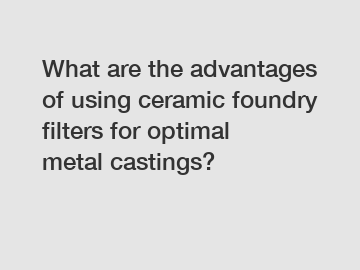What are the advantages of using ceramic foundry filters for optimal metal castings?
What are the advantages of using ceramic foundry filters for optimal metal castings? Ceramic foundry filters offer several benefits that contribute to the production of high-quality metal castings. These advantages include improved metal yield, reduced casting defects, enhanced dimensional accuracy, and increased mechanical properties.
Ceramic foundry filters are designed to remove impurities and reduce turbulence during the liquid metal flow in the casting process. By effectively capturing and removing impurities such as slag, dross, oxides, and non-metallic inclusions, these filters help in achieving a higher metal yield. This results in cost savings as more usable metal is obtained from the same amount of raw materials.
In addition to improving metal yield, ceramic foundry filters also play a crucial role in reducing casting defects. The filters act as a physical barrier, preventing the entry of unwanted particles into the molten metal. This leads to a significant reduction in defects such as sand inclusions, mold mismatch, and flame erosion. By minimizing these defects, the overall quality of the metal castings is improved.

Furthermore, the use of ceramic foundry filters ensures enhanced dimensional accuracy in metal castings. The filters help to regulate the flow of the molten metal by controlling the velocity and direction. This results in a more controlled filling of the molds, leading to precise and consistent dimensions in the final castings. The improved dimensional accuracy is particularly beneficial in industries where tight tolerances are required, such as aerospace and automotive sectors.
Apart from improving the physical properties of the castings, ceramic foundry filters also contribute to the enhancement of mechanical properties. The filters aid in reducing inclusions and impurities, which are known to weaken the mechanical strength of metals. By minimizing these defects, the castings exhibit improved mechanical properties such as higher tensile strength, hardness, and impact resistance. This makes them suitable for applications that require high-performance components.
The advantages of using ceramic foundry filters for optimal metal castings have significant implications for the overall casting process. By improving metal yield, reducing defects, enhancing dimensional accuracy, and increasing mechanical properties, these filters result in cost savings, improved product quality, and customer satisfaction. Furthermore, the use of these filters promotes sustainable practices in the foundry industry by reducing the amount of scrap metal generated and minimizing environmental impact.
In conclusion, the advantages of using ceramic foundry filters for optimal metal castings are evident through improved metal yield, reduced casting defects, enhanced dimensional accuracy, and increased mechanical properties. The adoption of these filters in the casting process contributes to cost savings, higher product quality, and sustainable manufacturing practices. As such, they have become an essential component in the foundry industry, enabling the production of high-quality metal castings.
If you want to learn more, please visit our website Industrial Fiberglass Filtration Manufacturer, Industrial Filtration Mesh, Aluminium Ceramic Filter Plate.



Comments
0